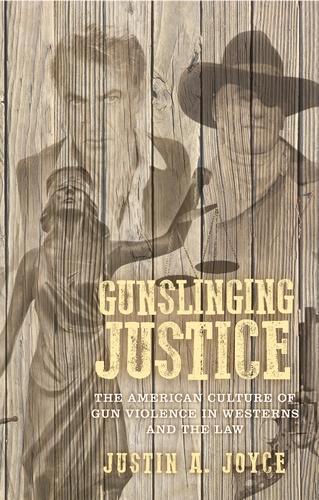
Gunslinging Justice: The American Culture of Gun Violence in Westerns and the Law
(Hardback)
Available Formats
Publishing Details
Gunslinging Justice: The American Culture of Gun Violence in Westerns and the Law
By (Author) Justin Joyce
Manchester University Press
Manchester University Press
21st August 2018
20th August 2018
United Kingdom
Classifications
Physical Properties
Hardback
264
Width 138mm, Height 216mm
Description
This book is a cultural history of the interplay between the Western genre and American gun rights and legal paradigms. From muskets in the hands of landed gentry opposing tyrannical government to hidden pistols kept to ward off potential attackers, the historical development of entwined legal and cultural discourses has sanctified the use of gun violence by private citizens and specified the conditions under which such violence may be legally justified. Gunslinging justice explores how the Western genre has imagined new justifications for gun violence which American law seems ever-eager to adopt. -- .
Reviews
'What does John Wayne have to do with the shooting of Trayvon Martin How are The Last of the Mohicans and Clint Eastwood connected to the 2008 Supreme Court case that defined current interpretations of the 2nd Amendment Justin Joyces insightful study, Gunslinging justice: The American culture of gun violence in Westerns and the law, brilliantly explains the roots of Americas glorification of violent white masculinity, Old West assumptions about the ideal citizen and his gun, as well as the historical development of so-called stand your ground laws. Moving effortlessly from classic literature to Hollywood Westerns, from property rights to race and the Constitution, Joyce explains the ways in which American jurisprudence shaped, and was shaped by, frontier mythologizing of Anglo masculine gun violence as a noble actwhether of self-defense, justice, or revenge.'
Sara L. Spurgeon, Professor of American Literature, Texas Tech University
Joyce is doing a lot of things at once. Film readings, jurisdictional reappraisal, legal history and cultural theory mixed with contemporary popular commentary. It is a brave and bold attempt to mingle self-defence doctrines as understood in law with homicide on an industrial scale in Americas most racked societies and see where the resultant cultural frames of reference might fall in the hope of providing answers.
Ian Scott, University of Manchester, Cercles: An Interdisciplinary Journal of English Studies (2019)
The book is a product of unique academic expertise and a model of interdisciplinary scholarship. Joyce places fundamental works of the Western genre in illuminating new frameworks. Gunslinging Justice is a major contribution to the ongoing debate about the Western as a manifestation of American gun culture.
Western American Literature
'Justin Joyce takes a unique approach to understanding the [Second] amendment in his book Gunslinging Justice. Joyce reflects on the interrelationship between American law and culture by tracing the development of self-defense jurisprudence and notions of justifiable gun use in cinematic westerns. Rather than arguing how to interpret the law, he considers its cultural influence by locating evidence of the emerging self-defense doctrine in westerns. Joyce's argument sidesteps contentious discussions of morality to instead examine America's changing mindset about maintaining order on the fringes of society... Gunslinging Justice ultimately invites readers to question justice in a nation plagued by mass violence.'
The Journal of American Culture
'The Western, set as it is against a "lawless frontier," serves as a point of contention between the civilizing settlers and the rugged individualist, and thus between the ideals of civilized, dispassionate justice and its swift, passionate, poetic version ... As the emphasis in American thought evolved from communal to individual defense, virtue changed from retreat to resistance, both concepts, Joyce argues, are most clearly manifested in the Western gunslinger... In all, Justin Joyce's monograph provides a unique and interesting perspective on the Western genre, particularly as it has evolved in conjunction with understandings of violence in American jurisprudence and culture. While his text occasionally veers into sociological theory that may prove a bit dense for an undergraduate reader, his numerous examples and analysis make the text readily comprehensible for academic readers. And, in a time when national headlines are filled with instances of racialized shootings by police or frightened citizens claiming to have acted in self-defense, it seems necessary to come to a fuller understanding of how the Western genre has influenced our society's past and how it continues to do so even today.'
The Journal of Popular Culture
Author Bio
Justin A. Joyce is Research Director for President McBride at The New School and Managing Editor of the James Baldwin Review
